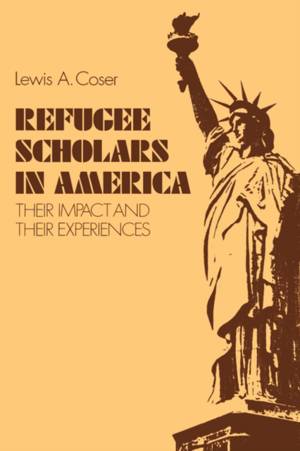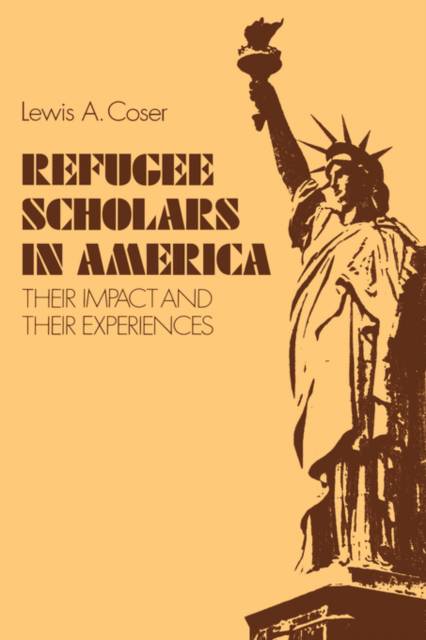
Door een staking bij bpost kan je online bestelling op dit moment iets langer onderweg zijn dan voorzien. Dringend iets nodig? Onze winkels ontvangen jou met open armen!
- Afhalen na 1 uur in een winkel met voorraad
- Gratis thuislevering in België vanaf € 30
- Ruim aanbod met 7 miljoen producten
Door een staking bij bpost kan je online bestelling op dit moment iets langer onderweg zijn dan voorzien. Dringend iets nodig? Onze winkels ontvangen jou met open armen!
- Afhalen na 1 uur in een winkel met voorraad
- Gratis thuislevering in België vanaf € 30
- Ruim aanbod met 7 miljoen producten
Zoeken
Omschrijving
What were the contributions to American scholarship and culture made by European refugees from Nazi persecution? How did these émigrés react to the experience of being strangers in the land of their refuge? In this engrossing book, Lewis Coser examines the impact of refugee intellectuals on the social sciences and the humanities in America, painting a collective portrait that sheds light not only on the accomplishments of the Europeans but also on the development of the several disciplines in America that either welcomed or rejected them.
Coser explains, for example, why the émigrés had more influence in the field of psychoanalysis than in psychology; why Austrian economists were more successful in America than were German economists; why only a few European sociologists made significant contributions in America. Discussing such luminaries as Bruno Bettelheim, Jacob Marshak, Hannah Arendt, Thomas Mann, Vladimir Nabokov, Roman Jacobson, Erwin Panofsky, and Paul Tillich, Coser describes their backgrounds, personalities, and careers in America, providing revealing anecdotes that help to bring these figures to life. His accounts of those who were famous in the country of their birth but never achieved eminence or a feeling of adjustment in America provide a poignant contrast.
Coser concludes that the refugee intellectuals were most influential in areas of study where they filled a perceived need not previously met or in fields where they could build on already established traditions. His perceptive analysis of the European-born men and women who altered American intellectual history is an absorbing and memorable story.
Coser explains, for example, why the émigrés had more influence in the field of psychoanalysis than in psychology; why Austrian economists were more successful in America than were German economists; why only a few European sociologists made significant contributions in America. Discussing such luminaries as Bruno Bettelheim, Jacob Marshak, Hannah Arendt, Thomas Mann, Vladimir Nabokov, Roman Jacobson, Erwin Panofsky, and Paul Tillich, Coser describes their backgrounds, personalities, and careers in America, providing revealing anecdotes that help to bring these figures to life. His accounts of those who were famous in the country of their birth but never achieved eminence or a feeling of adjustment in America provide a poignant contrast.
Coser concludes that the refugee intellectuals were most influential in areas of study where they filled a perceived need not previously met or in fields where they could build on already established traditions. His perceptive analysis of the European-born men and women who altered American intellectual history is an absorbing and memorable story.
Specificaties
Betrokkenen
- Auteur(s):
- Uitgeverij:
Inhoud
- Aantal bladzijden:
- 380
- Taal:
- Engels
- Reeks:
Eigenschappen
- Productcode (EAN):
- 9780300031935
- Verschijningsdatum:
- 1/10/1984
- Uitvoering:
- Hardcover
- Formaat:
- Genaaid
- Afmetingen:
- 152 mm x 229 mm
- Gewicht:
- 712 g

Alleen bij Standaard Boekhandel
+ 189 punten op je klantenkaart van Standaard Boekhandel
Beoordelingen
We publiceren alleen reviews die voldoen aan de voorwaarden voor reviews. Bekijk onze voorwaarden voor reviews.











